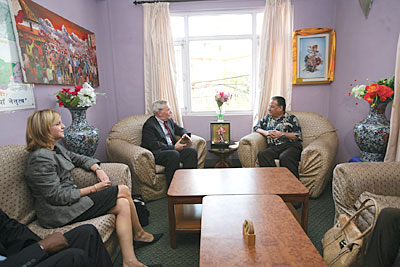 KIRAN PANDAY |
The most immediate challenge for the government and political parties is to cool temperatures over the monitoring of the Nepal Army and Maoist ex-combatants and the management of specific numbers of weapons in the wake of UNMIN's departure on 15 January.
Instead, there's the usual politicking and posturing.
The Maoists had previously agreed, though with some reluctance, that UNMIN's extension till 15 January would be the last one. But they have already written to the UN Security Council for yet another extension, knowing full well that this is not possible. Their reasoning is that vital elements of the peace process are still incomplete, especially the thorny issue of the Maoist ex-combatants' integration and rehabilitation.
This may be a valid concern but equally important is the question of who is to be blamed for the delay by not making sincere efforts to resolve the situation during the four months of UNMIN's extended tenure. Despite knowing that UNMIN cannot stay here for eternity, the Maoists have violated one agreement after another, delaying almost every aspect of the peace process.
Nepali Congress President Sushil Koirala says his party might agree on another extension for UNMIN, provided certain conditions are fulfilled, one of which is taking the Nepal Army out of the UN mission's monitoring purview. This is as silly a condition as one can come across. Even if the mission were to get another extension, one cannot change the terms and conditions midway through the peace process. NC, which has so far displayed a lot more resolve and character than any other non-Maoist party when it comes to making the Maoists honour agreements related to peace and the constitution, is clearly taking a wrong stance here.
Both sides are engaging in a useless debate. They should be focusing their energy on how to enable existing local mechanisms to manage the Maoist ex-combatants and their stored weapons, along with an equal number of weapons from the Nepal Army. UNMIN is on its way out, so there is no point arguing about the conditions under which it might stay.
The situation post-UNMIN assumes an urgency rarely witnessed since the political parties and ex-rebels came together in 2005. It demands dexterity, sensitivity and a little out-of-the-box-thinking. No doubt a tall order for the drivers of the peace process in the country, but they must salvage the situation despite naysayers who want to discard the peace process altogether. Not doing so will cost them both heavily, never mind the Nepali people.
The Maoists need to come good on their earlier pledge to transfer the control of ex-combatants to the Special Committee, which also includes members of their party. They have also consented to the appointment of retired Lt. Gen. Balananda Sharma as coordinator of the Special Committee Secretariat, which is entrusted with supervision, integration and rehabilitation of the combatants. In other words, be it UNMIN's scheduled exit, transfer of control of the Maoist ex-combatants, and their monitoring by the Special Committee, these are all outcomes of agreements with the Maoists. Nothing has changed to demand a change in the set-up.
On its part, the government, effectively an anti-Maoist coalition now, must not provoke their former partners by demanding immediate control of the stored weapons and details of the combatants living in UN-monitored cantonments.
A competent handling of this situation will not only avert a looming but very much avoidable crisis, but will also go a long way in restoring the trust among the parties.
READ ALSO:
Stop wasting time, EDITORIAL
Big Madhesi politics, PRASHANT JHA



